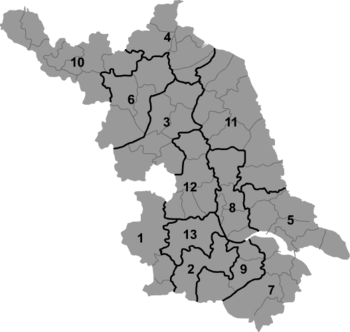Haimen
| Haimen 海门市 | |
|---|---|
| County-level city | |
| Nickname(s): The River Gateway to the Sea (江海门户) | |
 Haimen Location in Jiangsu | |
| Coordinates: 31°56′56″N 121°17′24″E / 31.949°N 121.290°ECoordinates: 31°56′56″N 121°17′24″E / 31.949°N 121.290°E[1] | |
| Country | People's Republic of China |
| Province | Jiangsu |
| Prefecture-level city | Nantong |
| Established (as a county) | 958 |
| Became independent subprefecture | 1768 |
| Became county-level city | June 1994 |
| Seat | Haimen Town |
| Government[2][3] | |
| • Deputy Mayor | Lu Yifei (陆一飞) (Communist Party of China) |
| Area[4] | |
| • Total | 1,148.77 km2 (443.54 sq mi) |
| Elevation[5] | 4.96 m (16.27 ft) |
| Highest elevation[5] | 5.2 m (17.1 ft) |
| Lowest elevation[5] | 2.5 m (8.2 ft) |
| Population (2000)[6] | |
| • Total | 942,952 |
| • Density | 820/km2 (2,100/sq mi) |
| Time zone | China Standard (UTC+8) |
| Postal code | 226100[7] |
| Area code | 0513[7] |
| Website |
haimen |
Haimen (simplified Chinese: 海门; traditional Chinese: 海門; pinyin: Hǎimén, Qihai dialect: [haɪ.məŋ], Shanghai: [hɛ̝.məŋ]) is a county-level city under the administration of Nantong, Jiangsu province, with a population of approximately 1 million. It is located at the opposite side of the Yangtze River to Shanghai and is directly north of Chongming Island except for a small portion that forms Haimen City's Haiyong Township.Haimen is the seat of the Roman Catholic Diocese of Haimen.
History
The area that is now Haimen was formed from silt deposits from the Yangtze River. Several sandbanks, including Dongzhou (东洲; 東洲) and Buzhou (布洲), joined together with the mainland in the Tang dynasty. In 958 CE, during the Later Zhou dynasty in the Five Dynasties and Ten Kingdoms period, Haimen County was established, the seat established at Dongzhou Town.[8]
Because the mouth of the Yangtze River moved northward during the Ming dynasty, Haimen has dealt with flooding that destroyed parts of the county, including Lüsi (吕四; 呂四), Yudong (余东; 余東), and Sijia (Chinese: 四甲).[8]
In 1672, under the Kangxi Emperor of the Qing dynasty, the seat moved to Jinghai Township (静海乡; 靜海鄉). Starting from 1701, the river's course moved south, creating more than 40 new sandbanks. In 1768, the county became an independent subprefecture with the seat moving to Maojia Town (茅家镇; 茅家鎮).[8]
In 1912, one year after the Republic of China was founded, Haimen once again became a county. However, in 1949, when the China was founded, Haimen became governed under Nantong Prefecture. Once county-level governments started to reappear in 1983, Haimen was reinstated as a county, and in June 1994, Haimen became a county-level city.[8]
Geography
Administrative divisions
Haimen is divided into twenty-one towns and one township, the pene-exclave of Haiyong on Chongming. These towns are further divided into 231 villages and three fishery villages.[9]
Climate
According to the Köppen climate classification system, Haimen has a humid subtropical climate (Cwa). This means that Haimen experiences four distinct seasons; the summers are hot and the winters are cold. The summers are rainier than the other seasons, and the summer rains usually bring flooding.[10]
The average temperature is 15.2 °C (59.4 °F) in Haimen. January is the coldest month, and July is the hottest month. The hottest temperature recorded in Haimen was 38.0 °C (100.4 °F), occurring on both August 7, 1966 and July 31, 1992. The coldest temperature ever recorded was −9.3 °C (15.3 °F) on January 31, 1977.[10]
The average yearly rainfall is 1,056.3 millimetres (41.59 in). The wettest year was 1975 with 1,500.7 millimetres (59.08 in), and the driest year was 1978 with 654.6 millimetres (25.77 in).[10]
Transport
Qinglonggang (t 青龍港, s 青龙港, Qīnglónggǎng), at the mouth of the Qinglong Creek, provides ferry service to nearby Chongming Island.
References
- ↑ Google (2014-07-02). "Haimen" (Map). Google Maps. Google. Retrieved 2014-07-02.
- ↑ Haimen Municipal People's Government. 陆一飞 (in Chinese). Retrieved 2010-07-30.
- ↑ Haimen Municipal People's Government (2010-03-10). 市政府关于市长副市长市长助理分工的通知 (in Chinese). Haimen. Retrieved 2010-07-30.
- ↑ Haimen Municipal People's Government. "Boundary & Area". Retrieved 2010-07-30.
- 1 2 3 Haimen Municipal People's Government. "Geographical Location". Retrieved 2010-07-30.
- ↑ Department of Economic & Social Affairs (2008). Demographic Yearbook 2005, Volume 57. United Nations Publications. p. 272. ISBN 978-92-1-051099-8. Retrieved 2010-07-30.
- 1 2 China National Philatelic Corporation (CNPC). "Area Code and Postal Code in Jiangsu Province". Retrieved 2010-07-30.
- 1 2 3 4 Haimen Municipal People's Government (2009-12-09). 建置沿革 (in Chinese). Retrieved 2010-07-30.
- ↑ Haimen Municipal People's Government. "Administrative Division". Retrieved 2010-07-30.
- 1 2 3 Haimen Municipal People's Government. "Weather & Cliamte". Retrieved 2010-07-30.
External links
- (Chinese) Regional topographical map
- (simplified Chinese) 行政区划 (Administrative Divisions of Haimen)
- (simplified Chinese) 地理位置 (Geography of Haimen)
- Haimen City English guide (Jiangsu.NET)
- (English) (Chinese) "Illustrated Album of Yangzhou Prefecture", from 1573-1620, has illustrations of Haimen
 |
Tongzhou | Yellow Sea |  | |
| |
Qidong | |||
| ||||
| | ||||
| Changshu, Nantong | Chongming, Shanghai, Yangtze River |